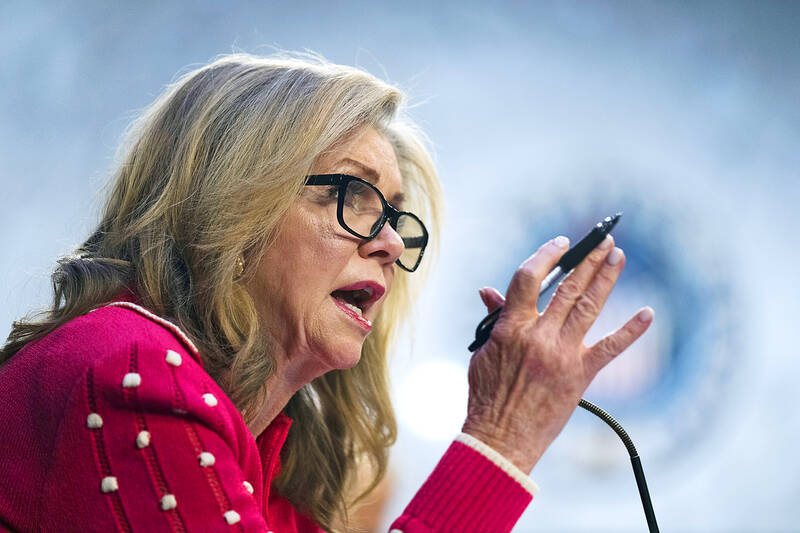US senators yesterday introduced a resolution urging US universities to collaborate with Taiwan to create Mandarin-language education programs as an alternative to China’s state-funded Confucius Institutes.
The move comes amid a sharp decline in Confucius Institutes, which are facing pressure from the US government due to allegations that they are involved in propaganda and espionage activities directed by Beijing.
The number of Confucius Institutes has fallen from more than 100 in 2017 to only seven this year due to pressure from Washington, a report published on the Axios news Web site said on Monday.

Photo: AP
The bill calls on US institutions of higher learning to support the US-Taiwan Education Initiative by creating Taiwanese-run language programs in favor of language programs run by the Chinese government, the report said.
“Communist China has had a strong presence at American colleges and universities,” US Senator Marsha Blackburn, a Republican from Tennessee who cosponsored the bill, said in a news release on Tuesday.
“Our institutes of higher learning must be free from China’s grasp while still teaching students about the culture, history and language, and Taiwan can help fill this critical void,” Blackburn said.
“If we want to continue building a strong relationship with Taiwan, then we need to support foreign-language exchange between our two nations,” US Senator Ed Markey, a Democrat from Nebraska who cosponsored the bill, said in the news release.
“This resolution reaffirms our nation’s commitment to expanding educational opportunities for people at home and abroad to learn English or Mandarin,” Markey said.
In 2020, the US Department of State ordered that Confucius Institutes must register as foreign missions of the Chinese government, while the US Congress in August barred universities that host the institutes from receiving defense-related research aid from the Pentagon.
That followed similar moves by the UK, which last week struck a deal with Taipei to provide Mandarin-language education in Taiwan to 200 British students per year.
The Ministry of Education said that a delegation it sent to the UK initiated discussions to broaden Taiwan’s participation in the Turing Scheme, a British international language and professional education program.
Taiwan receives 200 British students for Mandarin-language education and vocational training per year, a number the ministry wants to double, Deputy Minister of Education Liu Mon-chi (劉孟奇) said in a statement on Wednesday last week.
The UK has become wary of the national security risks posed by Confucius Institutes in its territory and urgently needs to replace the language-training capacity that they provided, Liu added.
In May, British Prime Minister Rishi Sunak announced that British government funding for the 30 Confucius Institutes in the UK would be halted, but declined to shutter the institutes outright, backtracking on an earlier pledge to close down the Chinese programs.

Seventy percent of middle and elementary schools now conduct English classes entirely in English, the Ministry of Education said, as it encourages schools nationwide to adopt this practice Minister of Education (MOE) Cheng Ying-yao (鄭英耀) is scheduled to present a report on the government’s bilingual education policy to the Legislative Yuan’s Education and Culture Committee today. The report would outline strategies aimed at expanding access to education, reducing regional disparities and improving talent cultivation. Implementation of bilingual education policies has varied across local governments, occasionally drawing public criticism. For example, some schools have required teachers of non-English subjects to pass English proficiency

‘FORM OF PROTEST’: The German Institute Taipei said it was ‘shocked’ to see Nazi symbolism used in connection with political aims as it condemned the incident Sung Chien-liang (宋建樑), who led efforts to recall Democratic Progressive Party (DPP) Legislator Lee Kun-cheng (李坤城), was released on bail of NT$80,000 yesterday amid an outcry over a Nazi armband he wore to questioning the night before. Sung arrived at the New Taipei City District Prosecutors’ Office for questioning in a recall petition forgery case on Tuesday night wearing a red armband bearing a swastika, carrying a copy of Adolf Hitler’s Mein Kampf and giving a Nazi salute. Sung left the building at 1:15am without the armband and apparently covering the book with a coat. This is a serious international scandal and Chinese

TRADE: The premier pledged safeguards on ‘Made in Taiwan’ labeling, anti-dumping measures and stricter export controls to strengthen its position in trade talks Products labeled “made in Taiwan” must be genuinely made in Taiwan, Premier Cho Jung-tai (卓榮泰) said yesterday, vowing to enforce strict safeguards against “origin laundering” and initiate anti-dumping investigations to prevent China dumping its products in Taiwan. Cho made the remarks in a discussion session with representatives from industries in Kaohsiung. In response to the US government’s recent announcement of “reciprocal” tariffs on its trading partners, President William Lai (賴清德) and Cho last week began a series of consultations with industry leaders nationwide to gather feedback and address concerns. Taiwanese and US officials held a videoconference on Friday evening to discuss the

PERSONAL DATA: The implicated KMT members allegedly compiled their petitions by copying names from party lists without the consent of the people concerned Judicial authorities searched six locations yesterday and questioned six people, including one elderly Chinese Nationalist Party (KMT) member and five KMT Youth League associates, about alleged signature forgery and fraud relating to their recall efforts against two Democratic Progressive Party (DPP) legislators. After launching a probe into alleged signature forgery and related fraud in the KMT’s recall effort, prosecutors received a number of complaints, including about one petition that had 1,748 signatures of voters whose family members said they had already passed away, and also voters who said they did not approve the use of their name, Taipei Deputy Chief Prosecutor